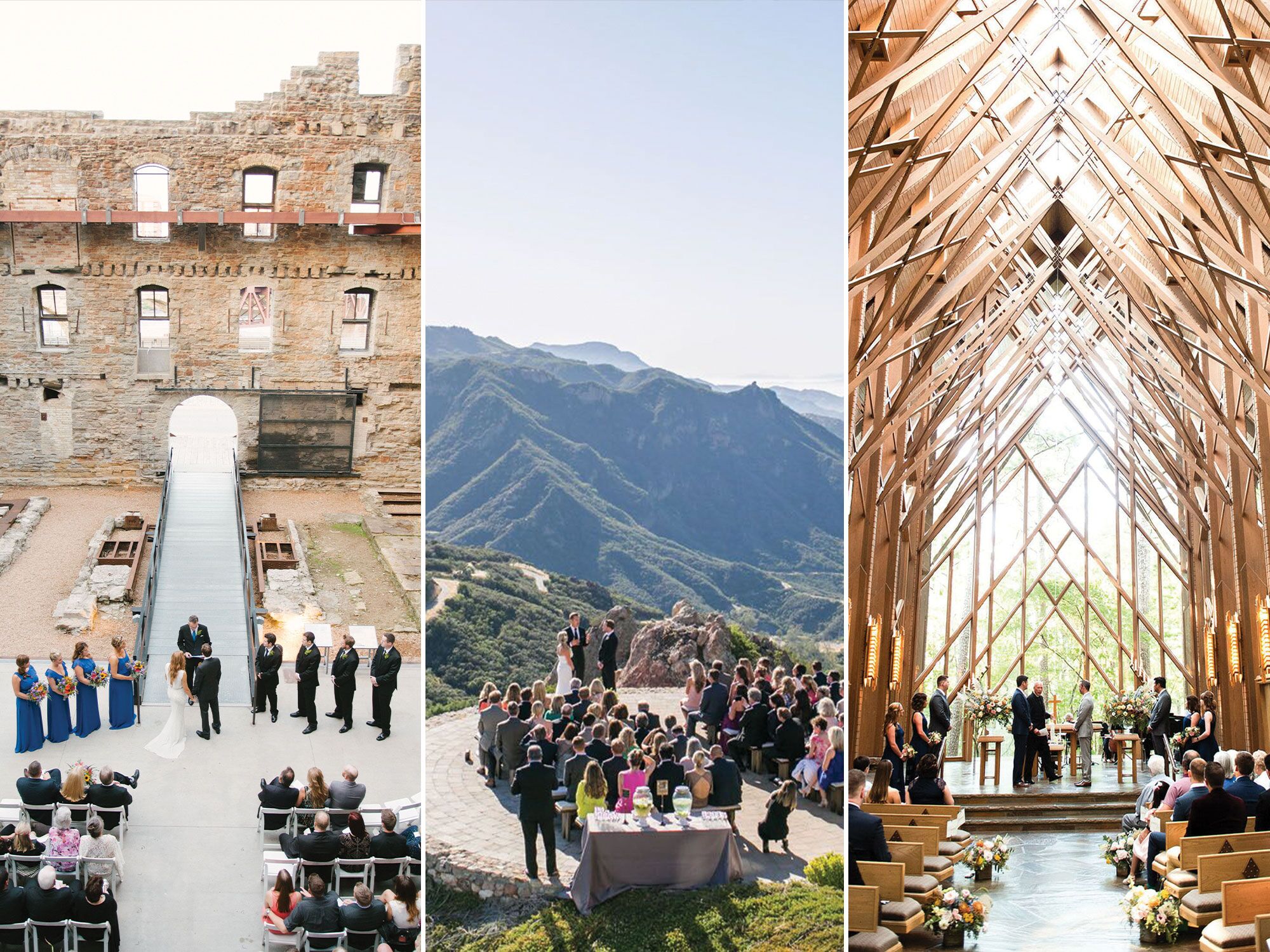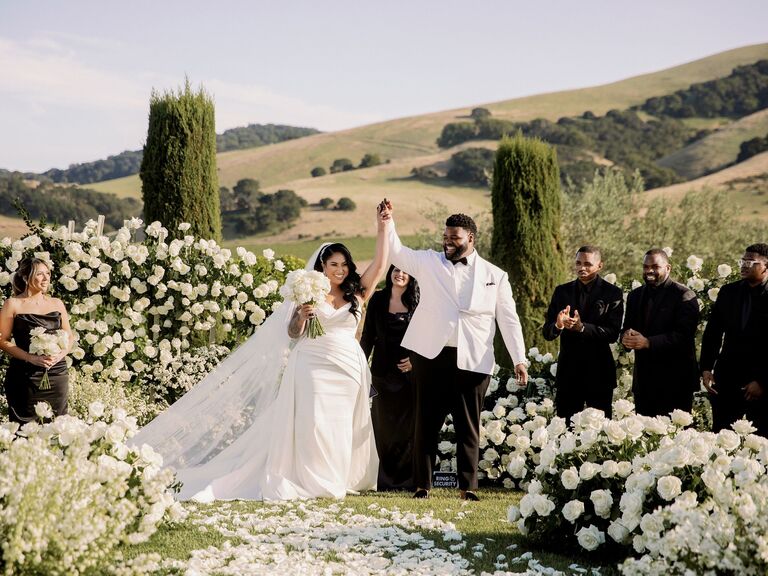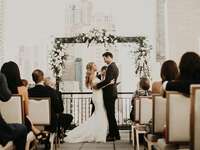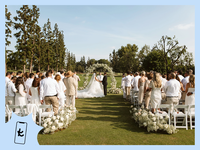How to Decide Where to Have a Wedding Ceremony
Deciding where to have a wedding ceremony is one of the first steps to planning your special day. The ceremony venue serves as the backdrop for the biggest moment of the day—when you officially become a married couple—so there are a lot of factors to consider for this important milestone. Whether you're looking for the perfect spot at the same venue as your reception or a different location altogether, The Knot Vendor Marketplace has you covered when you're researching places to have a wedding ceremony. We're breaking down the most popular options for where to have a wedding ceremony and outlining the must-consider details to keep in mind when you're choosing a ceremony site.
Wedding ceremony venue tips in this article: Where to Have | How to Find | Factors to Consider
Where to Have a Wedding Ceremony
These days, there are so many different wedding venue types to choose from that it can be difficult to decide what's actually right for you and your partner. Using data from The Knot 2023 Real Weddings Study, which polled nearly 10,000 newlyweds who were married in 2023, here are the most popular places to have a wedding ceremony—and the pros of each type of location.
Farm, barn or ranch
According to our internal data, most ceremonies take place at barn wedding venues, chosen by 17% of couples in 2023. Farms, ranches and barns have plenty of built-in charm for a rustic wedding theme. Plus, they're usually located in scenic countryside spots, which can provide a picturesque backdrop for your vows and ceremony photos.
Religious institution
Religious institutions and houses of worship are the second-most popular place to have a wedding ceremony, chosen by 16% of couples in 2023. As long as you're part of the congregation, houses of worship may not charge a fee like some other types of venues, but you could be asked to make a suggested donation in order to use the space for your ceremony.
Historical location
Historical locations—think estates, mansions and museums—are the third-most popular ceremony venue choice at 12%. If you're wondering where to have a wedding ceremony besides a church or religious institution, these types of locations tend to skew more traditional and formal, which could give you a similar vibe.
Botanical garden
Private garden wedding venues are the next most-popular option, accounting for 9% of couples' wedding ceremony locations in 2023. Botanical gardens and formal gardens are great choices if you're deciding where to have a wedding ceremony and want a location that feels romantic and picturesque, especially when paired with garden-themed wedding ideas like floral ceremony arches and flower-filled aisles.
Banquet hall
Banquet halls were also chosen by 9% of couples for their wedding ceremony. Since banquet halls usually have large rooms and multiple event spaces, they're a smart choice if having your ceremony and reception in the same place is important to you. And because some (key word: some) banquet halls are not as particular about certain wedding venue contract requirements or must-haves, they tend to be among the more affordable wedding venues.
Hotel
Chosen by 6% of couples in 2023, hotels are a top choice for planning an all-inclusive wedding. These ceremony venues usually have a team of in-house event coordinators and catering staff, which can help you streamline your wedding planning process. Hotels are also a great pick if you're hosting a lot of out-of-town guests or want to hold the ceremony and reception in one location.
Beach
Beaches accounted for 5% of couples' ceremony venues in 2023. Consider a beachy location if you're deciding where to have a civil wedding ceremony or if you want a gorgeous natural backdrop for your wedding photos. Just keep in mind that you may need a special permit for a beach wedding.
Winery or vineyard
From Napa to the midwest to the Mid-Atlantic, there are stunning vineyard and winery wedding venues all across the country. Accounting for 4% of couples' ceremony venues, wineries and vineyards are a perfect option if you want an outdoor ceremony followed by a celebratory toast.
Family home
According to our study, 4% of couples chose a family home or backyard as their ceremony venue in 2023. If you're wondering where to have a private wedding ceremony, a backyard wedding is a natural choice. But if it's not doable at your own home, look for privately owned estates nearby that rent out their property for events.
Restaurant
Wondering where to have a wedding ceremony for a small wedding? Consider restaurants, which accounted for 2% of couple's ceremony venues. These smaller spaces are ideal for downsizing your guest list and creating a laid-back experience. Depending on the restaurant you choose, you can follow the ceremony with a full-blown reception or simply enjoy a nice, relaxed meal with your loved ones.
How to Find Places to Have a Wedding Ceremony Near You
The first step when determining how to find a wedding venue near you is finalizing the city and state where you want to get married. In some cases, this might be an easy answer—but if you and your partner are from different parts of the country, or you're considering a destination wedding, it might take a little more thought and negotiation.
Once you know the general area for your wedding ceremony, you can start browsing The Knot Vendor Marketplace to find your exact venue. Filter results by your marrying location, budget, amenities and more criteria to narrow down your list of nearby venues.
Feeling really stumped? That's what The Knot Style Quiz is for. Answer a few basic questions about your wedding day and preferences, and we'll share our recommendations for ceremony venue, reception decor and more.
Factors to Consider When Choosing Where to Have a Wedding Ceremony
Like all wedding decisions, there are a few pros and cons to consider before you sign a contract or move forward with a specific wedding ceremony venue. Here's what you need to know about how to decide on a marrying location without hesitation.
The venue fees or donations work for your budget.
The property manager or coordinator should tell you the wedding venue cost for the ceremony up front. If you're getting married in a house of worship, call and ask about the suggested donation amount or talk to other couples who got married there to make sure it won't throw off your budget. Similarly, if you're getting married on the beach or in a public park, inquire about any permits you might need to get hitched there.



The reception venue is nearby and easy to access.
If your wedding reception venue doesn't have what you're looking for in a ceremony space, or there are other constraints, then it may make sense to have your ceremony in a separate location. Just remember, if you have your ceremony and reception in different spots, you'll end up paying more for several details including transportation, venue fees and even photography and videography, because hosting your wedding in two different places usually takes more time—and more wedding planning logistics. Minimize the added expenses by keeping your ceremony space nearby or close to your reception venue if you can.
It can fit all your guests.
It seems obvious, but we can't emphasize enough how important this point is. The maximum capacity of a space is usually set for fire safety regulations, so this isn't something to take lightly. In fact, it's possible that overfilling the space might lead your ceremony venue to turn you away or stop guests from coming inside (yikes!). If the wedding venue you love can't fit the number of guests you're inviting, you'll need to decide whether your priority is the ceremony space or cutting your guest list. If you're scoping out a spot, a good rule of thumb is to have at least 10 square feet per guest—that's not factoring in the space you'll need for your aisle, altar and musicians. Also consider the seating arrangement when calculating whether you'll have enough space. A circular or amphitheater setup may require more room than traditional rows. The event coordinator or your wedding planner should know the exact guest count the space can accommodate and help you determine the best layout.
You can use or rent the space for as long as you need—without feeling rushed.
You'll need access to the ceremony space for at least two to three hours so there's enough time to set up and break down without feeling pressured, especially if there's another wedding before or after yours. You may also want access to the space ahead of time for family photos and portraits. On the opposite end of things, some venues may have a minimum amount of time they'll allow you to rent the space, and if the minimum time is way more than you need, you'll likely end up paying for it, which is something to negotiate with the venue and factor into your budget.
It has the must-have amenities.
The average ceremony lasts about 30 to 45 minutes, which may not seem like a long time, but most of your guests will arrive 15 to 30 minutes early, and it takes a few minutes to exit the venue. Altogether, it's enough time that your guests will need easy access to a restroom and shouldn't be sitting in sweltering heat without shade or left out in the cold without heat. Take into account whether there are basic amenities in place for your guests, like restrooms, parking, heating or air-conditioning and what the cost will be if you'll need to bring in, say, portable restrooms, valet service, heaters or umbrellas for shade. "If there are no outlets in reach, you can always use a small, portable generator as a backup," says Annie Lee, founder of Daughter of Design in New York City.
Once you've ticked all the basic essentials off the list, think about other less crucial (but still important) details, like whether the site allows candles or other décor you want to include, or if it's possible to set up amplified sound. "If it's an outdoor ceremony, you don't want the officiant to sound like they're screaming at the top of their lungs, or if they can't shout, many won't be able to hear," says Jeannie Savage, founder of Details Details in Southern California. Also, if your potential venue is outdoors, see if it has backup options in case the weather takes a turn for the worse (and what the costs are).
There's flattering lighting for the time of day you're getting married.
Aside from the walk down the aisle, you'll be standing in one place for the majority of the ceremony, so it's important that lighting is just right for wedding photos—and so your guests can actually see what's going on. If your ceremony will be outside, figure out how the sun will hit at the time of day you're planning to get married. Indoors, the sun can make an impact on the lighting of the space if there are large windows. "Think about the time of sunset and how much light will be coming in. For example, you don't want weird tree shadows cast or guests glaring into the sun," Lee says.
There's a Plan B in case of bad weather.
While we're all hoping for sunny skies on your big day, if you're planning an outdoor wedding ceremony, you'll need to prepare for bad weather, too. While having your wedding ceremony outside is probably your first choice, you should also be happy and comfortable with the indoor option, as well. When you're making a list of questions to ask a wedding venue, have your wedding venue coordinator walk you through the Plan B, whether it's a tented ceremony or a fully indoor event, during your site tour. Also, discuss when you'll have to make the call on whether you're hosting an indoor or outdoor ceremony (usually a few days before the wedding).
There's plenty of peace and quiet.
Having some privacy is important for your reception, but more so for the ceremony—especially if you're hosting an intimate wedding day or elopement. This is the time when you want to be fully present, and any loud noises or unexpected passersby can take away from the intimate, romantic feeling and distract your guests. Ask the venue manager questions about whether you'll have the space to yourselves on your wedding day and how they plan to keep others out if there will be a few special events that day, or if there are public spaces nearby. If you're getting married in a public place, like a park or museum, where it may not be possible to be totally secluded, you'll need to decide if not having a guaranteed private wedding is something you're okay with in order to say "I do" in your dream ceremony space.
Samantha Iacia contributed to the reporting of this article.





















